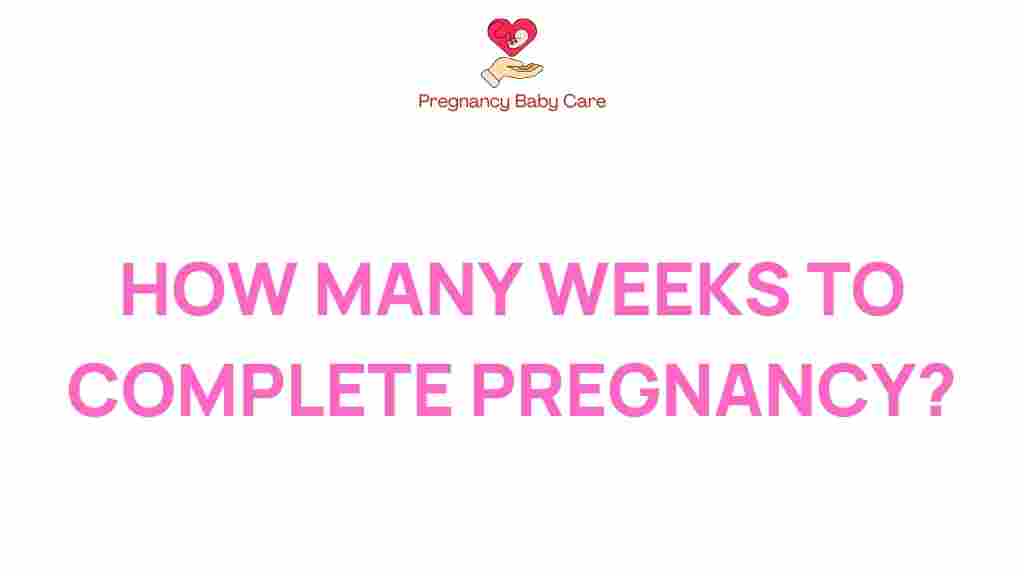Unlocking the Mystery: How Many Weeks Are in a Full Pregnancy?
When it comes to understanding pregnancy duration, many expectant parents often find themselves asking, “How many weeks are in a full pregnancy?” The answer is typically around 40 weeks, but the journey through these weeks can vary greatly among individuals. This article will delve deeper into the gestation period, explore the weeks of pregnancy, and discuss the importance of prenatal care for both maternal health and baby development.
Understanding Pregnancy Duration
The average pregnancy duration is about 40 weeks, calculated from the first day of the last menstrual period (LMP) to the birth of the baby. Here’s how the timeline breaks down:
- First Trimester: Weeks 1 to 12
- Second Trimester: Weeks 13 to 26
- Third Trimester: Weeks 27 to 40
However, it’s essential to note that full-term pregnancy can range from 37 to 42 weeks. Babies born before 37 weeks are considered preterm, while those born after 42 weeks are considered post-term.
The Gestation Period: A Closer Look
The gestation period refers to the time from conception to birth. This period encompasses several critical stages of development for the fetus, and understanding these stages can help parents-to-be prepare for the changes that lie ahead.
Week-by-Week Breakdown
Here’s a brief overview of the key milestones during the weeks of pregnancy:
- Weeks 1-4: Fertilization occurs, and the embryo begins to implant in the uterus.
- Weeks 5-8: Major organs begin to develop, and the heart starts to beat.
- Weeks 9-12: The embryo is now referred to as a fetus, and significant growth occurs.
- Weeks 13-16: The fetus develops more distinct features, including facial features and limbs.
- Weeks 17-20: The mother may begin to feel the first movements of the baby.
- Weeks 21-24: The fetus can hear sounds and has developed a sense of taste.
- Weeks 25-28: The third trimester begins, and the fetus starts to gain weight rapidly.
- Weeks 29-32: The baby’s lungs mature, and the body prepares for birth.
- Weeks 33-36: The baby moves into a head-down position in preparation for delivery.
- Weeks 37-40: The final weeks leading up to birth, during which the baby is considered full-term.
The Importance of Prenatal Care
Throughout the pregnancy timeline, prenatal care is crucial for ensuring maternal health and monitoring baby development. Regular check-ups allow healthcare providers to assess the health of both the mother and the fetus, provide essential screenings, and offer guidance on maintaining a healthy lifestyle during pregnancy.
Key Aspects of Prenatal Care
- Regular Check-ups: Visiting your healthcare provider at least once a month during the first two trimesters, every two weeks during the third trimester, and weekly as the due date approaches.
- Screenings and Tests: Blood tests, ultrasounds, and other screening tests to monitor the health of both mother and baby.
- Nutritional Guidance: Recommendations for diet and supplements, such as folic acid, which is vital for fetal development.
- Exercise and Wellness: Advice on safe physical activities to maintain fitness and well-being during pregnancy.
Maternal Health and Baby Development
Maintaining good maternal health is essential for the optimal growth and development of the baby. Here are some key tips for expectant mothers:
- Stay Hydrated: Drinking plenty of water helps support overall health and can reduce pregnancy-related complications.
- Balanced Diet: Eating a variety of fruits, vegetables, whole grains, and lean proteins ensures that both mother and baby receive necessary nutrients.
- Avoid Harmful Substances: Staying away from alcohol, tobacco, and illicit drugs is crucial for the baby’s health.
- Manage Stress: Finding healthy ways to cope with stress can benefit both the mother’s and baby’s well-being.
Common Questions About Pregnancy Duration
Expectant parents often have many questions regarding the length and stages of pregnancy. Here are a few commonly asked questions:
- Can pregnancy last longer than 40 weeks? Yes, pregnancy duration can extend beyond 40 weeks. It’s essential to monitor the mother’s health and the baby’s well-being as the due date approaches.
- What happens if the baby is born early? Babies born before 37 weeks may face challenges, including respiratory issues and other complications. However, many preterm babies thrive with proper care.
- How can I prepare for labor and delivery? Attending prenatal classes, creating a birth plan, and discussing options with a healthcare provider can help prepare parents for labor and delivery.
Troubleshooting Common Concerns
As the pregnancy progresses, expectant mothers may encounter various concerns. Here are some common issues and how to address them:
- Morning Sickness: This often occurs during the first trimester. Eating small, frequent meals and staying hydrated can help alleviate symptoms.
- Fatigue: It’s normal to feel tired, especially in the first and third trimesters. Listening to your body and resting when needed is vital.
- Back Pain: Many women experience back pain as the baby grows. Gentle stretching and prenatal yoga can provide relief.
Conclusion
Understanding the pregnancy duration and the various stages of fetal development can empower expectant parents to take charge of their maternal health and prepare for the arrival of their baby. From the early weeks of conception to the final days leading up to birth, each moment is essential for both mother and baby.
By prioritizing prenatal care, maintaining a healthy lifestyle, and being informed about the weeks of pregnancy, parents can ensure a positive experience as they navigate this exciting journey. For more information on fertility and pregnancy, you can visit this resource.
Every pregnancy is unique, and while the average gestation period is around 40 weeks, it’s essential to embrace the experience and seek support when needed. If you have further questions, consult with your healthcare provider to ensure a healthy pregnancy.
This article is in the category Pregnancy and created by PregnancyBabyCare Team
